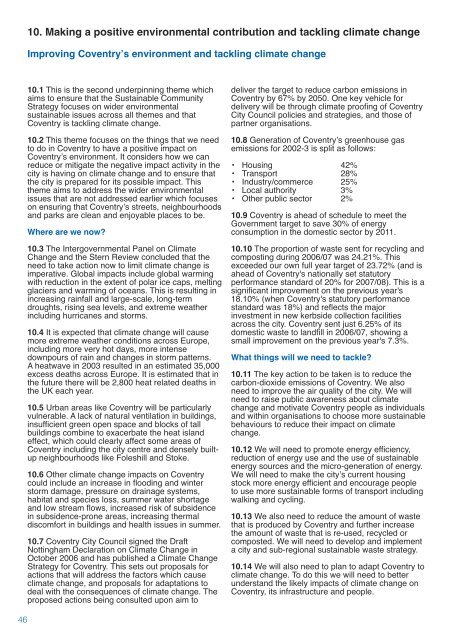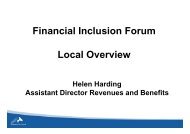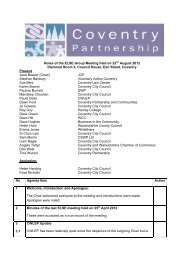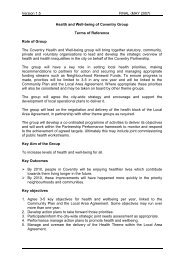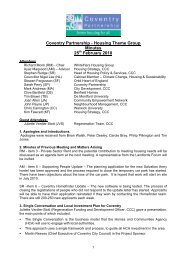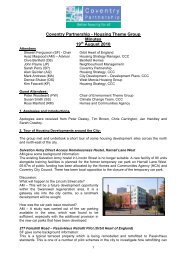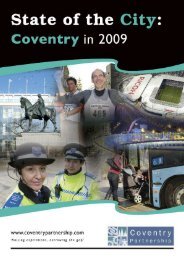Sustainable Community Strategy - Coventry Partnership
Sustainable Community Strategy - Coventry Partnership
Sustainable Community Strategy - Coventry Partnership
Create successful ePaper yourself
Turn your PDF publications into a flip-book with our unique Google optimized e-Paper software.
10. Making a positive environmental contribution and tackling climate change<br />
Improving <strong>Coventry</strong>ʼs environment and tackling climate change<br />
10.1 This is the second underpinning theme which<br />
aims to ensure that the <strong>Sustainable</strong> <strong>Community</strong><br />
<strong>Strategy</strong> focuses on wider environmental<br />
sustainable issues across all themes and that<br />
<strong>Coventry</strong> is tackling climate change.<br />
10.2 This theme focuses on the things that we need<br />
to do in <strong>Coventry</strong> to have a positive impact on<br />
<strong>Coventry</strong>ʼs environment. It considers how we can<br />
reduce or mitigate the negative impact activity in the<br />
city is having on climate change and to ensure that<br />
the city is prepared for its possible impact. This<br />
theme aims to address the wider environmental<br />
issues that are not addressed earlier which focuses<br />
on ensuring that <strong>Coventry</strong>ʼs streets, neighbourhoods<br />
and parks are clean and enjoyable places to be.<br />
Where are we now?<br />
10.3 The Intergovernmental Panel on Climate<br />
Change and the Stern Review concluded that the<br />
need to take action now to limit climate change is<br />
imperative. Global impacts include global warming<br />
with reduction in the extent of polar ice caps, melting<br />
glaciers and warming of oceans. This is resulting in<br />
increasing rainfall and large-scale, long-term<br />
droughts, rising sea levels, and extreme weather<br />
including hurricanes and storms.<br />
10.4 It is expected that climate change will cause<br />
more extreme weather conditions across Europe,<br />
including more very hot days, more intense<br />
downpours of rain and changes in storm patterns.<br />
A heatwave in 2003 resulted in an estimated 35,000<br />
excess deaths across Europe. It is estimated that in<br />
the future there will be 2,800 heat related deaths in<br />
the UK each year.<br />
10.5 Urban areas like <strong>Coventry</strong> will be particularly<br />
vulnerable. A lack of natural ventilation in buildings,<br />
insufficient green open space and blocks of tall<br />
buildings combine to exacerbate the heat island<br />
effect, which could clearly affect some areas of<br />
<strong>Coventry</strong> including the city centre and densely builtup<br />
neighbourhoods like Foleshill and Stoke.<br />
10.6 Other climate change impacts on <strong>Coventry</strong><br />
could include an increase in flooding and winter<br />
storm damage, pressure on drainage systems,<br />
habitat and species loss, summer water shortage<br />
and low stream flows, increased risk of subsidence<br />
in subsidence-prone areas, increasing thermal<br />
discomfort in buildings and health issues in summer.<br />
10.7 <strong>Coventry</strong> City Council signed the Draft<br />
Nottingham Declaration on Climate Change in<br />
October 2006 and has published a Climate Change<br />
<strong>Strategy</strong> for <strong>Coventry</strong>. This sets out proposals for<br />
actions that will address the factors which cause<br />
climate change, and proposals for adaptations to<br />
deal with the consequences of climate change. The<br />
proposed actions being consulted upon aim to<br />
deliver the target to reduce carbon emissions in<br />
<strong>Coventry</strong> by 67% by 2050. One key vehicle for<br />
delivery will be through climate proofing of <strong>Coventry</strong><br />
City Council policies and strategies, and those of<br />
partner organisations.<br />
10.8 Generation of <strong>Coventry</strong>ʼs greenhouse gas<br />
emissions for 2002-3 is split as follows:<br />
• Housing 42%<br />
• Transport 28%<br />
• Industry/commerce 25%<br />
• Local authority 3%<br />
• Other public sector 2%<br />
10.9 <strong>Coventry</strong> is ahead of schedule to meet the<br />
Government target to save 30% of energy<br />
consumption in the domestic sector by 2011.<br />
10.10 The proportion of waste sent for recycling and<br />
composting during 2006/07 was 24.21%. This<br />
exceeded our own full year target of 23.72% (and is<br />
ahead of <strong>Coventry</strong>'s nationally set statutory<br />
performance standard of 20% for 2007/08). This is a<br />
significant improvement on the previous year's<br />
18.10% (when <strong>Coventry</strong>'s statutory performance<br />
standard was 18%) and reflects the major<br />
investment in new kerbside collection facilities<br />
across the city. <strong>Coventry</strong> sent just 6.25% of its<br />
domestic waste to landfill in 2006/07, showing a<br />
small improvement on the previous year's 7.3%.<br />
What things will we need to tackle?<br />
10.11 The key action to be taken is to reduce the<br />
carbon-dioxide emissions of <strong>Coventry</strong>. We also<br />
need to improve the air quality of the city. We will<br />
need to raise public awareness about climate<br />
change and motivate <strong>Coventry</strong> people as individuals<br />
and within organisations to choose more sustainable<br />
behaviours to reduce their impact on climate<br />
change.<br />
10.12 We will need to promote energy efficiency,<br />
reduction of energy use and the use of sustainable<br />
energy sources and the micro-generation of energy.<br />
We will need to make the cityʼs current housing<br />
stock more energy efficient and encourage people<br />
to use more sustainable forms of transport including<br />
walking and cycling.<br />
10.13 We also need to reduce the amount of waste<br />
that is produced by <strong>Coventry</strong> and further increase<br />
the amount of waste that is re-used, recycled or<br />
composted. We will need to develop and implement<br />
a city and sub-regional sustainable waste strategy.<br />
10.14 We will also need to plan to adapt <strong>Coventry</strong> to<br />
climate change. To do this we will need to better<br />
understand the likely impacts of climate change on<br />
<strong>Coventry</strong>, its infrastructure and people.<br />
46


